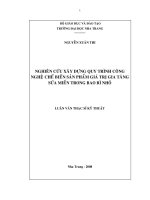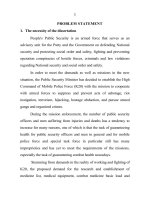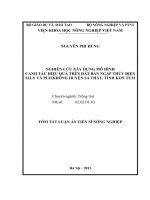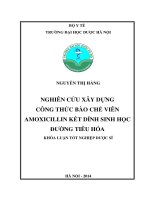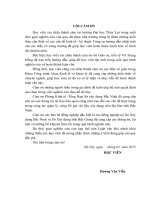1376 Nghiên cứu xây dựng nội dung - Tiêu chuẩn kiểm tra đánh giá kĩ năng thực hành môn Điền kinh chuyên sâu cho sinh viên Khoa Giáo dục Thể ch.docx
Bạn đang xem bản rút gọn của tài liệu. Xem và tải ngay bản đầy đủ của tài liệu tại đây (167.62 KB, 11 trang )
TRƯỜNG
HỌC
SƯ PHẠM TP HỒ CHÍ MINH
TẠP ĐẠI
CHÍ
KHOA
HO CHI MINH JOURNAL
CITY UNIVERSITY
EDUCATION
OFOFSCIENCE
HỌC
EDUCATION
ISSN:
SCIENCE Vol. 15, No.
1859KHOA HỌC GIÁO DỤC
3100
7 (2018): 89-98
Tập 15, Số 7 (2018): 89-98
Email: ; Website:
A STUDY ON CONSTRUCTING STANDARDS FOR
ASSESSING AND EVALUATING PRACTICE SKILLS FOR
ATHLETICS SUBJECT
OF THE PHYSICAL EDUCATION FACULTY
Phan Thi My Hoa* Le Viet Duc, Nguyen Duc Kim Ngan
Ho Chi Minh City University of Education
Received: 02/5/2018; Revised: 02/6/2018; Accepted: 25/7/2018
ABSTRACT
From a practical need during our teaching process, we have conducted a study on
constructing standards for assessing and evaluating practice skills for students majoring
in Athletics of the Physical Education Faculty, Ho Chi Minh City University of
Education, including 100-metre short distance run, medium distance run (800 metres for
females and 1,500 metres for males), the high jump, the long jump, the shot-put, javelin,
the triple jump and hurdles. The rubrics are strictly set to be in compliance with the
rules and to ensure reliability.
Keywords: content, assessment, evaluation, skills, expertise, Athletics, Physical
Eductaion Faculty.
TÓM TAT
Nghiên cứu xây dựng n i dung - Tiêu chuan kiem tra kánh giá kĩ nǎng
thực hành môn Ðien kinh chuyên sâu cho sinh viên Khoa Giáo
dnc The chat
Tù nhu cau thnc te trong q trình giảng dạy, chúng tơi dã tien hành nghiên cúu
xây dnng nội dung – tiêu chuẩn dánh giá kĩ năng thnc hành môn Điền kinh chuyên sâu
cho sinh viên Khoa Giáo dục Thể chất Trường Đại học Sư phạm Thành phố Hồ Chí Minh
ở các môn: Chạy cn li ngắn 100m, chạy cn li trung bình (800m nữ hoặc 1500m nam),
nhảy cao, nhảy xa, dẩy tạ, ném dĩa, ném lao, nhảy tam cấp, chạy vuợt rào. Các nội dung
dánh giá dược thiet lập tuân thủ chặt chẽ các quy tắc và dảm bảo dộ tin cậy.
Từ khóa: nội dung, đánh giá, kĩ năng, chun mơn, chuyên sâu điền kinh, Khoa
Giáo dục Thể chất.
1.
Introduction
Physical education is both one aspect of a comprehensive education and an
integral part of the education system of the Vietnamese Communist Party and the
Vietnamese government. Human beings are considered as valuable assets of the
1
TRƯỜNG
ĐẠI HỌC
SƯ PHẠM TP
HỒ CHÍ MINH
MINH CITY UNIVERSITY
OF EDUCATION
society;
health
is people’s
precious
capzital. HO
TheCHICommunist
Party and
the
government always care about activities of Sports in general and physical
education in particular, especially of the
*
Email:
2
TẠP CHÍ KHOA HỌC - Trường ĐHSP TPHCM
Tập 15, Số 7 (2018): 8998
education of the young generation. Article 41 Constitution of the Socialist Republic of
Vietnam in 1992 mentioned the "regulations of mandatory physical education in schools
and universities" [Congress, 1992]. Circular No. 8387/MOET on 08/09/1999 of the
Ministry of education and training was also issued to implement physical education in
1999-2000.
Physical education in the school is an indispensable task, which always receives
attention from the Party, the government and the educational leaders due to its goal to
improve the structure and function of human body and to educate ethics, intellect, spirit
and aesthetics, etc., to meet the goal of training people for comprehensive development
for the industrialization and modernization of the country. Consequently, the construction
of standards for assessing and evaluating practice skills for students majoring in Athletics
of the Physical Education Faculty, Ho Chi Minh City University of Education is very
necessary and important.
Starting from the above mentioned issues, we have conducted research on the topic:
“A Study on Constructing Standards for Assessing and Evaluating Practice Skills
for students majoring in Athletics of the Physical Education Faculty, Ho Chi Minh
City University of Education”
2.
Methodology and scope of the study
2.1. Research Methods: to solve research tasks, the following research methods are applied:
- Data synthesis and analysis;
- Interview;
- Pedagogical examination;
- Mathematical statistics.
2.2. Research scope
All contents of evaluating academic achievement of students, cohort 9 to 15,
Department of Education of Ho Chi Minh City University of Education, period 2010 2017.
2.3. Research period
The study was conducted from April 2017 to April 2018.
3.
Research outcomes
3.1. Assessing the current state of examining and evaluating professional skills of students
majoring in Athletics of the Physical Education Faculty, Ho Chi Minh City University
of Education (2010 – 2017)
The current state of examining and evaluating professional skills of students
majoring in Athletics of the Physical Education Faculty, Ho Chi Minh City University of
Education is as follows:
3
TẠP CHÍ KHOA HỌC - Trường ĐHSP TPHCM
Phan Thi My Hoa et
al.
The in-depth training program for students majoring in Athletics of the Physical
Education Faculty, Ho Chi Minh City University of Education, consists of 4 modules:
semester I of year 2, semesters II and III of year 3 and semester IV of year 4.
Module 1: Teaching Methodology Athletics major 1 (120 periods): Discus throw,
High jump ‘back through the bar’, Methodology of curriculum design and teaching in
Athletics (advanced)
Module 2: Teaching Methodology Athletics major 2 (120 periods): Hurdles 100mH, Triple jump, Discus throw.
Module 3: Teaching Methodology Athletics major 3 (120 periods): Short distance
run-100mR, Medium distance run - 800mR, High jump, Long jump, Shot-Put, Arbitration
methods.
Module 4: Teaching Methodology Athletics major 4 (60 periods): Fields of
expertise (choose 1 of 5 contents: 100mR, 1500mR, High jump, Long jump, Shot-put),
Theory of Athletics.
Based on the results of the assessment of the professional skills of students
majoring in Athletes of the Physical Education Faculty, Ho Chi Minh City University of
Education from 2010 to 2015, we found that the program had all the basic subjects in
Athletics, the technical examination and assessment process for all subjects is not
seriously conducted. There was also a lack of correspondence between theory and
practice and of correlation between technical scores and performance scores.
Furthermore, the process was not comprehensive enough to measure all groups of skills.
Besides, the Physical Education Faculty, Ho Chi Minh City University of Education does
not have their own standard rating system. The current rating system is based on a
number of other universities (such as the University of Physical Education and Sports) to
evaluate students’ learning outcomes. Therefore, transparency and objectivity have not
yet been demonstrated and the reliability and validity of assessment activities have not
been established.
In terms of students’ learning activities, most Athletics major classes are not fully
enrolled. Students are psychologically reluctant to study Athletics due to the nature of this
subject, i.e. learning activities are performed outdoors with extensive exposure to direct
sunlight. In addition, this subject requires perseverance, high spirit, exertion and activity.
Physical exercises can cause fatigue and they require students to complete numerous
activities. As a result, it’s difficult for students to make high academic achievement and
the scores of this subject are often lower than those of other subjects.
4
TẠP CHÍ KHOA HỌC - Trường ĐHSP TPHCM
Tập 15, Số 7 (2018): 8998
3.2. Constructing standards for assessing and evaluating practice skills for students
majoring in Athletics of the Physical Education Faculty, Ho Chi Minh City University
of Education
•
•
•
•
In order to address the research objectives, during the study, we conducted the
following tasks:
Based on the regulations of the Ministry of Education and Training, the training
objectives, the current state and students’ competency at Ho Chi Minh City University of
Education, the Physical Education Faculty should change the assessment standards of
performance skills for the students of the faculty, including skills related to Javelin, High
jump, Hurdles, Triple jump, Discus throw, Short distance run, Medium distance run,
Long jump, and Shot-put:
The assessment criteria of Athletics must fully reflect the four skill groups: theoretical
knowledge of sports, the knowledge of curriculum design and lesson plans, organizing
methods of competitions and arbitration, skills of sports and competition strategy;
The correspondence between theory and practice should be enhanced;
Assessment and evaluation standards should include techniques and performance;
Performance scores should be determined according to students’ level and ability.
Figure 1. Marking rubrics and guidelines for semester I and
No.
Subjects
Guidelines
Criteria
Score
Technical performance (1-10 points)
Technique
deduction
1.
Javelin
A:
no
point
Technique B: deduct 1 point for
every mistake
Technique C: deduct
for every mistake
2 points
Technique D: deduct
for every mistake
3 points
-Run-up skill
-The
"Pre-Delivery
Stride" skill
30%
-Technical coordination skill
Technique F: deduct 5 points for
every 3 mistakes
2.
High jump
- Student’s performance is scored
based on athletics rules (marking
rubric)
5
-
Running-jump skill
-
“Push-off” skill
-
Clearing-the-bar/
60%
TẠP CHÍ KHOA HỌC - Trường ĐHSP TPHCM
Phan Thi My Hoa et
al.
- Technique (deduct 1 point for
every single mistake)
Attendance and
practice
3.
Bar-rotation skill
-
Landing-on-the-mat skill
- Full attendance: 5%
10%
- Active practice: 5%
From the above background and requirements, we have developed standards for
assessing and evaluating basic skills for athletes.
The rubrics for Semester I to Semester IV are presented in figure 1 – 4.
Figure 2. Marking rubrics and guidelines for semester II
No.
Subjects
Guidelines
Criteria
Scores
Technical performance (1-10 points)
Technique
deduction
1.
Hurdles
A:
no
point
- “Takeoff”-skill
- leaping-over-the obstacles
skill
Technique B: deduct 1 point for every
- Maintaining- speed-while
mistake
jumping- over-theTechnique C: deduct 2 points for
obstacles skill
every mistake
- Clearing-hurdles and
Technique D: deduct 3 points for
finishing skill
every mistake
30%
Technique F: deduct 5 points for
every 3 mistakes
- Running-jump skill
2.
3.
4.
Tripple
jump
Discus
Throw
Attendance and
practice
- Push-off skill
- Student’s performance is scored based
on athletics rules (marking rubric)
- Technique coordination
skill
- Technique (deduct 1 point for every
Swinging
single mistake)
spinning skills
and
60%
Releasing skill
Technical coordination
skill
-
Full attendance: 5%
-
Active practice: 5%
6
10%
TẠP CHÍ KHOA HỌC - Trường ĐHSP TPHCM
Tập 15, Số 7 (2018): 8998
Figure 3. Marking rubrics and guidelines for semester III
No.
Subjects
Guidelines
Criteria
Scores
- Starting
skill
Accelarating skill
1.
- Achieving and
maintaining
maximum
and
sub-maximum
velocity skill
100mR
- Finish
skill
line
- Running jump
skill
2.
3.
- “Push off” skill
High jump “back
through the bar”
- Clearing
the
bar/ Bar rotation skill
- Student’s performance is
scored based on athletics rules
(marking rubric)
- Technical
coordination skill
- Technique (deduct 1 point
for every single mistake)
- Body
positioning skill
- Shot delivering skill
Shot-put
- Technical
coordination skill
4.
5.
- Starting
and
accelerating skill
800mR
(women) and
1500mR (men)
- Running- break-line
skill
- Speedmaintaining skill
- “Takeoff”speed skill
Long jump
- Pushing-offthe-board skill
7
60%
TẠP CHÍ KHOA HỌC - Trường ĐHSP TPHCM
Phan Thi My Hoa et
al.
- Flying-over- the-pit
skill
- Technical coordination
skill
6.
Athletics theory
7.
Attendance and
participation
- Know how to organize competitions
and to apply arbitration methods in
accordance with the current
athletics rules
-
Full attendance: 5%
-
Active practice: 5%
- Arbitration methods
and foundation
subjects
30%
10%
Figure 4. Marking rubrics and guidelines for semester IV
No.
1.
2.
Subjects
Electives
Theory
Guidelines
Student’s performance is scored based on athletics rules
(marking rubric)
Technique (deduct 1 point for every single mistake)
Criteria
Sco
- Performance in
electives
30
Complete all curriculum design and development
Curriculum design.
(syllabus, lesson plan, arbitration methods, competing
Lesson planning
methods) (50%)
Implementation of lesson plan (i.e., content, methodology, Organization of
competition and
facility and equipment, organizing) (25%)
arbitration methods
Know how to organize competitions and to apply
arbitration methods in accordance with the current
athletics rules
8
60
TẠP CHÍ KHOA HỌC - Trường ĐHSP TPHCM
Tập 15, Số 7 (2018): 8998
Figure 5. Scoring for athletics
Subjects
Gender
Scores
10
9
8
7
6
5
4
3
2
1
12”2
12”5
12”7
13”
13”3
13”6
13”9
14”2
14”5
14”8
Women
14”8
15”
15”2
15”5
15”8
16”1
16”4
16”7
17”
17”3
1500mR
Men
5’05
5’10
5’15
5’20
5’27
5’34
5’41
5’48
5’55
6’02
800mR
Women
2’54
300’
306’
3’13
3’20
3’27
3’34
3’41
3’48
3’55
High
jump
(back
through
the bar)
Men
1m65
1m60
1m55
1m50
1m45
1m40
1m35
1m30
1m25
1m20
Women
1m40
1m35
1m30
1m25
1m20
1m15
1m10
1m05
1m00
0m95
Shot-put
5kg
Men
9m40
9m10
8m80
8m50
8m20
7m90
7m60
7m30
7m00
6m70
Shot-put
3kg
Women
8m40
8m10
7m80
7m50
7m20
6m90
6m60
6m30
6m00
5m70
Men
5m55
5m40
5m30
5m15
5m00
4m80
4m60
4m40
4m20
4m00
Women
4m20
4m05
3m95
3m80
3m65
3m50
3m35
3m20
3m05
2m90
Men
100mR
Long
jump
Hurdles
55m
Men
8”1
8”4
8”7
9"0
9”3
9”7
10”0
10”3
10”5
10”7
Hurdles
50m
Women
8”6
8”9
9”2
9”5
9”8
10”1
10”4
10”7
10”9
11”01
Men
27
25
23
21
19
18
17
16
15
14
Women
20
19
18
17
16
15
13
11
9
8
Men
27
26
25
24
22
21
20
19
18
17
Women
22
21
20
19
18
17
16
15
14
13
Men
11m00
10m85
10m70
10m50
10m35
10m10
9m90
9m70
9m50
9m30
Women
9m00
8m85
8m75
8m50
8m35
8m10
7m90
7m70
7m50
7m30
Javelin
Discus
throw
Triple
jump
9
TẠP CHÍ KHOA HỌC - Trường ĐHSP TPHCM
4.
Phan Thi My Hoa et
al.
Conclusion
Based on the results of the project, the following conclusions can be drawn:
In order to improve the quality of training for Physical Education teachers and to
meet the current social requirements, Athletics majors should be evaluated according to
four groups of skills: discipline theory, knowledge of curriculum design and lesson plans,
competitions and arbitration methods, skills of sports and competition strategy.
The program had all the basic subjects in Athletics, the technical examination and
assessment process for all subjects is not seriously conducted. There was also a lack of
correspondence between theory and practice and of correlation between technical scores
and performance scores. Furthermore, the process was not comprehensive enough to
measure all groups of skills. Besides, the Physical Education Faculty, Ho Chi Minh City
University of Education does not have their own standard rating system. The current
rating system is based on a number of other universities (such as the University of
Physical Education and Sports) to evaluate students’ learning outcomes. Therefore,
transparency and objectivity have not yet been demonstrated and the reliability and
validity of assessment activities have not been established.
Based on common backgrounds, we have constructed assessment standards and
evaluating practice skills for students majoring in Athletics of the Physical Education
Faculty, Ho Chi Minh City University of Education
It is possible to use the standards for assessing and evaluating practice skills for
students majoring in Athletics of the Physical Education Faculty, Ho Chi Minh City
University of Education
Conflict of Interest: Authors have no conflict of interest to declare.
REFERENCES
Nguyen Ky Anh. (1992). Vietnam youth – SOS (health and physical education in schools). Hanoi:
Ministry of Education and Training.
The Ministry of University, Secondary and Vocational school. (1898). Physical Education program
in universities, colleges and vocational schools.
Duong Nghiep Chi. (1998). Sports measurement. Hanoi: Sports Publisher.
Duong Nghiep Chi, Nguyen Kim Minh, Pham Khac Hoc, Vo Đuc Phung, Nguyen Đai Duong,
Nguyen Văn Quang, Nguyen Quang Hung (2000). Athletics Textbook. Hanoi: Sports
Publisher.
10
TẠP CHÍ KHOA HỌC - Trường ĐHSP TPHCM
Tập 15, Số 7 (2018): 8998
Tran Thi Nguyet Dan. (2001). Developing indicators of physical development level of Central
College of Music and Artists (Scientific research – Physical education, Health in schools at
all levels). Hanoi: Sports Publisher.
Pham Minh Hac. (1995). Investment in education is investment for development. Education and
the Times, (1).
Congress. (1992). The Constitution of the Socialist Republic of Vietnam in 1992.
Dong Van Trieu. (2000). Theory and methodology of Physical education in schools. Hanoi: Sports
Publisher.
Do Vinh, Huynh Trong Khai. (2008). Statistics in sports. Hanoi: Sports Publisher.
11
